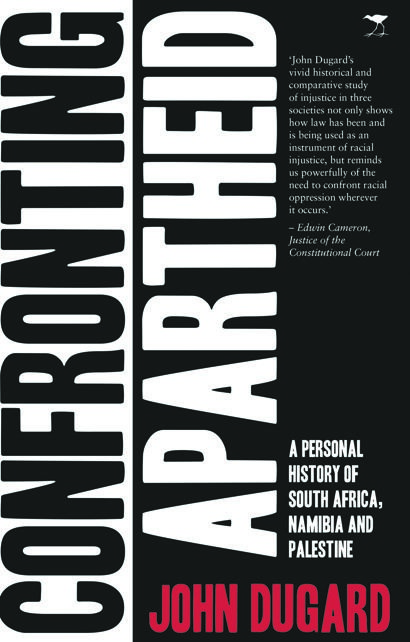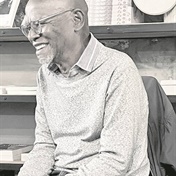
How will the volatile situation in the Middle East play out? Will Israel succumb to international pressure the way South Africa and Namibia eventually did? In this extract from his new book, celebrated South African-born legal academic and human rights activist John Dugard can't help feeling optimistic
Confronting Apartheid: A Personal History of South Africa, Namibia and Palestine by John Dugard
Jacana Media
302 pages
R280
The experience of South Africa’s Anti-Apartheid Movement (AAM) shows that a campaign of the kind employed by Boycott, Divestment and Sanctions (BDS) takes time to have serious effect, but in the long run its consequences are severe. In South Africa the AAM succeeded in isolating the country and in damaging its economy.
BDS has already made headway in Israel and is likely to grow. In response, several countries have attempted to criminalise the advocacy of BDS, but these measures are more likely to publicise the movement and what it stands for than to suppress it. Protest action of this kind will not go away until the reason for the protest disappears.
International legal action should not be underestimated. In recent times the government of Palestine has started to invoke remedies under international law to compel Israel to comply with its obligations. It is considering a further advisory opinion from the International Court of Justice to obtain legal endorsement of the illegality of Israel’s occupation.
This year it filed a complaint against Israel in terms of the International Convention on the Elimination of all Forms of Racial Discrimination (CERD) in which it claimed that Israel was guilty of practising racial discrimination and apartheid in occupied Palestine. This is the first time in its 50-year history that such a complaint has been filed by one state against another. The complaint will be considered in the first instance by the committee on the elimination of racial discrimination, the committee charged with monitoring CERD. If it is unable to resolve the dispute to the satisfaction of the parties, the matter will be referred to an ad hoc conciliation commission to consider the facts and to make recommendations for the resolution of the dispute. Undoubtedly, a finding that Israel practises apartheid in the occupied Palestinian territories will have serious political repercussions.
A more serious threat is posed to Israel by the International Criminal Court (ICC). Palestine became a party to the Rome Statute of the ICC in 2015. This allows the court to exercise jurisdiction over international crimes committed within Palestine, even by nationals of a state not a party to the Rome Statute.
At present the prosecutor of the ICC is conducting a preliminary examination into whether Israeli officials and military leaders could be investigated and prosecuted for war crimes and crimes against humanity arising from the construction of settlements and the application of apartheid in the West Bank and the attack on Gaza in 2014. A boost was given to this process on May 22 this year when the government of Palestine decided to expedite investigation of Israel’s crimes by itself, referring Israel’s criminal conduct to the Office of the Prosecutor, despite threats from the US that it would impose sanctions on Palestine if it resorted to such measures.
Although it is unlikely senior Israeli political and military figures will face prosecution before the ICC, there is no doubt that if the prosecutor decides to open an investigation and prosecution into Israel’s actions this will damage Israel’s reputation and legitimacy seriously.
It will put pressure on other states to take concerted action to enforce international law, among other things by arresting and transferring to the ICC any Israeli official indicted for such crimes.
An advisory opinion of the International Court of Justice, such as that rendered in 2004, could be disregarded, but the stigma attached to its criminality might make it difficult for states to ignore demands for the enforcement of fundamental rules of international law inherent in a criminal investigation by the ICC, a finding that Israel practises apartheid under CERD, and that support for BDS cannot be ignored indefinitely by the Western nations that have traditionally led the way in promoting respect for the rule of law in international relations. In the long term governments of the West and international institutions will be compelled to respond to these violations by taking action against Israel. International public opinion will demand it. The government of Israel is aware of this. Hence its determination to suppress BDS and civil society activism and to oppose and evade the reach of the ICC. The case of Israel is similar to that of Namibia. Israel has violated well-established rules of international law relating to the ban on settlements, the annexation of territory, apartheid, self-determination, humanitarian law and human rights law. Many of these violations have been confirmed by the International Court of Justice and the Security Council already.
In the long run, the UN, with the support of European states, will not be able to resist action based on international law. Israel endangers its future by focusing on how to oppose and suppress its critics rather than addressing the ending of the occupation and establishing normal relations with its neighbour. Failure to do this will have political, economic and security consequences for the state of Israel, resulting in severe consequences for its people. As with white South Africans under apartheid, they will become a pariah people, tolerated but not respected, increasingly isolated from the world and damned with the stigma of apartheid.
Inevitably this isolation will intensify. Apartheid delegitimised white-ruled South Africa. It has delegitimised the occupation of Palestine already. If continued, the stigma of apartheid will be used to delegitimise Israel itself. Already many have widened the concept of apartheid to include discriminatory policies and practices in Israel itself. South Africa has a special interest in a just solution to the Israel-Palestine conflict. Historically it has a close relationship with Israel. General Jan Smuts endorsed the Balfour Declaration and ensured the South African government supported both the partition of Palestine in 1947 and the recognition of the state of Israel in 1948. The apartheid regime maintained close ties with Israel at a time when other allies scorned it. These ties were cemented by the presence of a substantial Jewish community, numbering about 120 000 in the 1970s, which undoubtedly constituted the most liberal section of the white community during the apartheid era.
The end of apartheid brought about a reversal of policy on the part of the government. South Africa now recognises Palestine as an independent state, maintains diplomatic relations with Palestine and consistently votes in favour of UN resolutions condemning Israel for its treatment of Palestinians. Policy is guided by the declaration of Nelson Mandela shortly after he was released from prison that: “We know too well that our freedom is incomplete without the freedom of the Palestinians.” Although policies have changed over the years, South Africa has always had, and still has, a special relationship with Israel. Today this special relationship extends to Palestine. It is therefore incumbent on South Africa, with its experience of apartheid, to use its good offices and influence to promote and facilitate a just solution to the conflict. That a solution to the conflict in the Middle East will be found is clear. History teaches us that conflicts of this kind cannot continue for ever. Whether such a solution will be fair to both Jews and Palestinians is unpredictable. But it is the very unpredictability of history that makes me optimistic. For most of my life I believed that apartheid in South Africa would end in bloodshed, that civil war would engulf us all and that we would take years to recover. But then a miracle occurred. Overnight both parties came to their senses under wise leadership, the bloodbath was avoided and a constitutional democracy was established. The land between the Mediterranean Sea and the Jordan River is the land of miracles.




 Publications
Publications
 Partners
Partners









